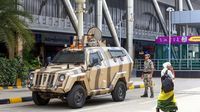Amid escalating tensions between India and Pakistan, air travel in the region has come to a standstill as 27 airports across northern, western, and central India were shut down on May 9, 2025. This drastic measure has led to the cancellation of 430 flights, which accounts for about 3 percent of the country’s total scheduled flights, according to reports.
The Bureau of Civil Aviation Security (BCAS) has issued directives to tighten security across all Indian airports, raising the alert level to the highest possible. This move follows a series of provocative actions from Pakistan, including drone and missile attacks aimed at military installations in the Indian states of Jammu, Punjab, and Rajasthan on the night of May 8, 2025. In retaliation, India launched strikes on several locations in Pakistan, including Rawalpindi and Gujranwala, further intensifying the conflict.
As the situation escalated, the Civil Aviation Ministry announced that the affected airports would remain closed until 5:29 AM on Saturday, May 10, 2025. The list of shut airports includes major hubs such as Srinagar, Jammu, Chandigarh, and Amritsar, among others. In total, the airports impacted by the shutdown are:
- Srinagar
- Jammu
- Leh
- Chandigarh
- Amritsar
- Ludhiana
- Patiala
- Bathinda
- Halwara
- Pathankot
- Bhuntar
- Shimla
- Kangra-Gaggal
- Dharamshala
- Kishangarh
- Jaisalmer
- Jodhpur
- Bikaner
- Mundra
- Jamnagar
- Rajkot
- Porbandar
- Kandla
- Keshod
- Bhuj
The ripple effect of these closures has been felt beyond India, with Pakistani carriers also cancelling over 147 flights, which is roughly 17 percent of their daily air traffic. Global flight tracking service Flightradar24 reported that the airspace over the western corridor of India, which stretches from Kashmir to Gujarat, was largely devoid of civilian aircraft as airlines opted to avoid the sensitive region.
In response to the heightened security risks, airlines operating within India have issued advisories urging passengers to arrive at the airport at least three hours prior to their scheduled flights. Air India, for instance, emphasized the importance of allowing extra time for check-in and security processes. The airline stated, “In view of an order by the Bureau of Civil Aviation Security on enhanced measures at airports, passengers across India are advised to arrive at their respective airports at least three hours prior to scheduled departure to ensure smooth check-in and boarding.”
Other airlines, including IndiGo and Akasa Air, echoed similar sentiments, advising travelers to prepare for longer wait times due to increased security checks. IndiGo has cancelled all flights to and from key northern and western cities, including Srinagar, Jammu, and Amritsar, until 11:59 PM on May 10, 2025. The airline also urged passengers to carry valid government-approved photo identification for entry into the airport.
As part of the new security measures, BCAS has mandated that all passengers undergo Secondary Ladder Point Checks (SLPC), which are additional security checks before boarding. Visitor entry into terminal buildings has been halted, and passengers will face an extra layer of screening for both themselves and their cabin baggage just before boarding. Furthermore, random checks of passenger bags and physical inspections of cargo are now standard procedures.
The Kempegowda International Airport in Bengaluru has also issued a passenger advisory, reminding travelers to arrive at least three hours prior to their flights. The advisory stated, “In view of the nationwide heightened security alert, enhanced screening measures are in place across all airports. Passengers are advised to arrive at least three hours prior to departure to allow for a smooth check-in, security, and boarding experience.”
While the situation has created significant disruptions, Delhi’s Indira Gandhi International Airport has confirmed that operations continue as normal, albeit with some flight cancellations and delays due to shifting airspace conditions. More than 90 domestic and international flights to and from Delhi were cancelled, with over 200 delayed on May 8, 2025, due to the heightened security environment.
The current crisis is a stark reminder of the fragile peace between India and Pakistan, two nuclear-armed nations whose historical tensions have often flared into conflict. The recent attacks and subsequent military responses underscore the precarious situation in the region, leaving civilians and travelers caught in the crossfire.
As of now, airlines are working to accommodate affected passengers, offering options for rebooking or refunds without additional charges. However, with the ongoing conflict and uncertainty surrounding air travel in the region, travelers are advised to stay informed and check with their airlines for the latest updates regarding flight statuses and security protocols.
In this climate of uncertainty, the priority remains the safety of passengers and the need for heightened vigilance at all aviation facilities. The BCAS has directed all stakeholders to take utmost precautions to prevent any untoward incidents at airports, airstrips, and other aviation-related installations.
As the situation develops, it is crucial for travelers to remain patient and cooperative with security personnel, ensuring that safety remains the foremost concern during this tumultuous period.




